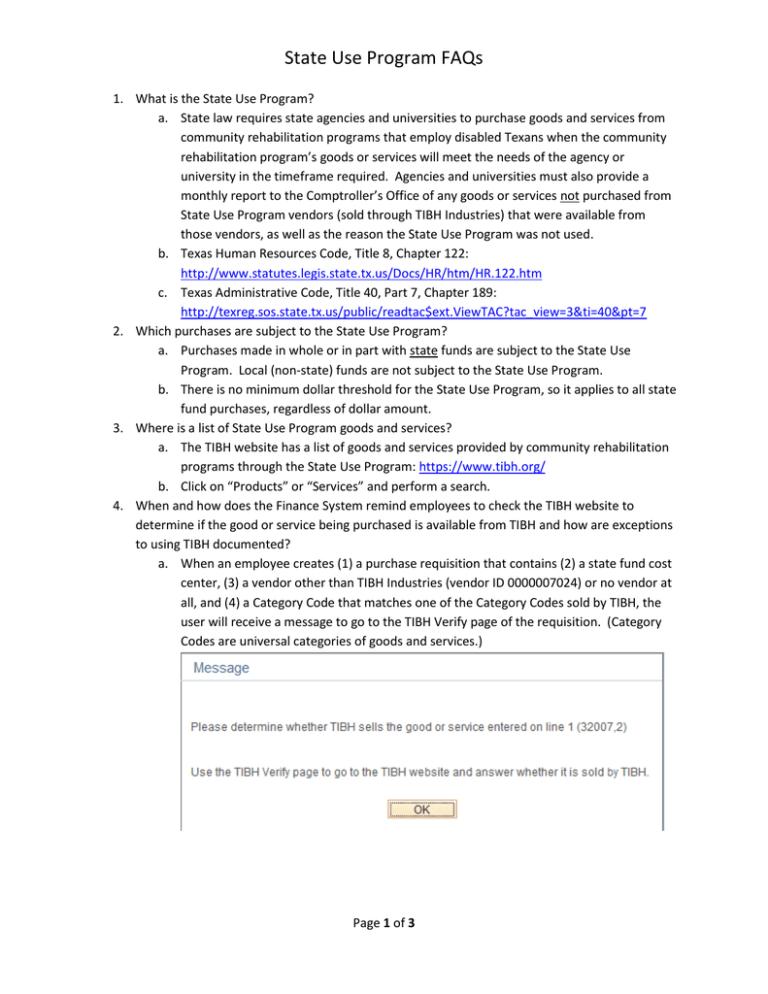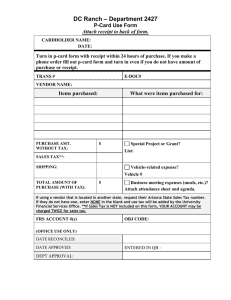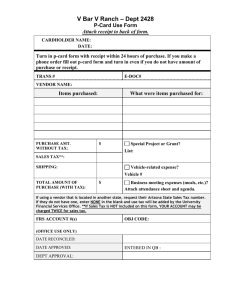State Use Program FAQs
advertisement

State Use Program FAQs 1. What is the State Use Program? a. State law requires state agencies and universities to purchase goods and services from community rehabilitation programs that employ disabled Texans when the community rehabilitation program’s goods or services will meet the needs of the agency or university in the timeframe required. Agencies and universities must also provide a monthly report to the Comptroller’s Office of any goods or services not purchased from State Use Program vendors (sold through TIBH Industries) that were available from those vendors, as well as the reason the State Use Program was not used. b. Texas Human Resources Code, Title 8, Chapter 122: http://www.statutes.legis.state.tx.us/Docs/HR/htm/HR.122.htm c. Texas Administrative Code, Title 40, Part 7, Chapter 189: http://texreg.sos.state.tx.us/public/readtac$ext.ViewTAC?tac_view=3&ti=40&pt=7 2. Which purchases are subject to the State Use Program? a. Purchases made in whole or in part with state funds are subject to the State Use Program. Local (non-state) funds are not subject to the State Use Program. b. There is no minimum dollar threshold for the State Use Program, so it applies to all state fund purchases, regardless of dollar amount. 3. Where is a list of State Use Program goods and services? a. The TIBH website has a list of goods and services provided by community rehabilitation programs through the State Use Program: https://www.tibh.org/ b. Click on “Products” or “Services” and perform a search. 4. When and how does the Finance System remind employees to check the TIBH website to determine if the good or service being purchased is available from TIBH and how are exceptions to using TIBH documented? a. When an employee creates (1) a purchase requisition that contains (2) a state fund cost center, (3) a vendor other than TIBH Industries (vendor ID 0000007024) or no vendor at all, and (4) a Category Code that matches one of the Category Codes sold by TIBH, the user will receive a message to go to the TIBH Verify page of the requisition. (Category Codes are universal categories of goods and services.) Page 1 of 3 State Use Program FAQs b. The TIBH Verify page on the purchase requisition has a link to the TIBH website where the user can determine if TIBH sells the exact same good or service being purchased. c. The user returns to the TIBH Verify page of the requisition to answer “Yes” or “No” as to whether the same good or service is available from TIBH. d. If “No” is answered, the user clicks the “Save” button to save their answer and no further action is required. e. If “Yes” is answered, the user can either (1) change the vendor on the requisition to TIBH Industries (vendor ID 0000007024) or (2) select one or more of the following reasons why the item is not being purchased through TIBH and click “Save”: i. Quantity – The quantity offered by TIBH is larger or smaller than the quantity needed. ii. Quality – The quality of the TIBH good or service does not meet the requirements of the purchase. iii. Delivery Time – TIBH cannot provide the good or service in the timeframe needed. iv. Life Cycle Cost - It is more efficient to use an existing UH System contract than TIBH. v. Testing/Inspection – The TIBH good or service failed testing or inspection or cannot be tested or inspected. f. Note that the price of the good or service is not a justifiable reason for choosing another vendor. g. The identity of the user and date and time of the last update is recorded on the TIBH Verify page. 5. Who completes the monthly report to the Comptroller of goods and services not purchased from TIBH and how is the information compiled? a. Each UHS component designates a State Use Program Coordinator (usually in the Purchasing Department) to complete the monthly report. b. The Coordinator runs a query to retrieve information for the monthly exception report based on responses entered on the TIBH Verify page of requisitions created during the previous month. c. UHS components do monthly State Use Program exception reporting based on a sampling of purchases (only using purchase requisitions), rather than on all purchases, as allowed by Human Resources Code 122.0095(b). Page 2 of 3 State Use Program FAQs 6. What are the requirements for state fund purchases made on regular vouchers and P-Cards, instead of on requisitions? a. Employees who make state fund purchases with a P-Card or voucher are responsible for verifying that TIBH does not sell the good or service before making their purchase. b. If TIBH sells the same good or service to be purchased, it meets the needs of the university, and can be delivered in the required timeframe, the employee should create a purchase requisition, instead of using a P-Card or voucher, and order the good or service from TIBH through Purchasing. c. If TIBH sells the same type of good or service to be purchased, but it does not meet the university’s needs or cannot be delivered in time, the employee should complete their purchase with the non-TIBH vendor using a voucher or P-Card. The employee is not required to document their findings or report this to Purchasing. d. If TIBH does not sell the type of good or service to be purchased, the employee should complete their purchase with the non-TIBH vendor with a voucher or P-Card. There is no requirement to document their findings or report this to Purchasing. 7. Who do I contact if I have questions about the State Use Program? a. UH: Jack Tenner, 713-743-5671 b. UHCL: Jeanne Cumpian, 281-283-2150 c. UHD: Lorena Sanchez, 713-221-8561 d. UHV: Shawn Clark, 361-570-4367 Page 3 of 3

